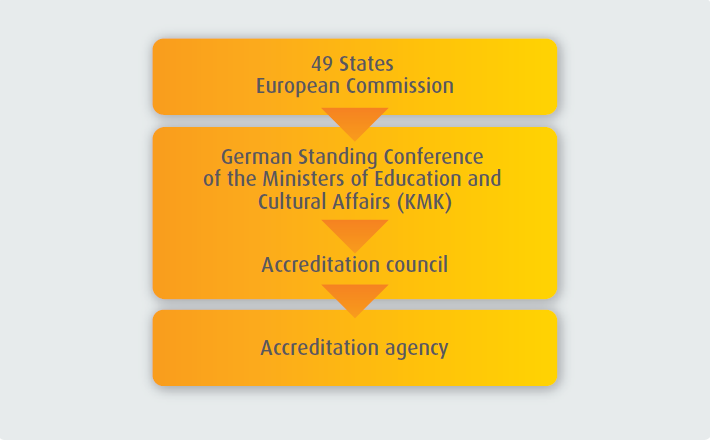The overarching aim of the Bologna Process is to create a European Higher Education Area (EHEA) based on international cooperation and academic exchange that is attractive to European students and staff as well as to students and staff from other parts of the world.
The European Higher Education Area will
- facilitate mobility of students, graduates and higher education staff
- prepare students for their future careers and for life as active citizens in democratic societies, and support their personal development
- offer broad access to high-quality higher education, based on democratic principles and academic freedom.
As subtargets, this includes among others:
- the gearing of the European Higher Education Area with the European Research Area, in particular the inclusion of doctoral studies in the Bologna process. (Structure of Graduate College)
- the promotion of the European dimension in higher education (joint degree programs)
- the promotion of mobility by overcoming obstacles to mobility; meant not only geographical mobility, but also cultural skills and mobility between universities and courses (blended learning concepts are supported and encourages)
- Promotion of European cooperation in quality development (joint-degree programs)
- social dimension: equitable access and completion
- lifelong learning
- employability
- student-centred learning and the teaching mission of higher education
- education, research and innovation
- international openness
- mobility
- data collection
- multidimensional transparency tools
- funding
The framework of qualifications for the European Higher Education Area
- One of the most famous results of the Bologna process is the establishment of a system of three successive cycles in higher education.
- First cycle qualification: 180–240 ECTS-Credits
Bachelor-Qualification. - Second cycle qualification: 60–120 ECTS-Credits
Master-Qualifikation. - Third cycle qualification: Doctoral studies with independent research; doctorate degrees / PhD
(no ECTS basis; assumed workload of three to four years of full-time employment).
Education, and cooperation on its behalf, are generally acknowledged to be the most important objectives for the development and strengthening of stable and peaceful societies. For this reason, 49 states have been participating in the Bologna Process since 1998. For more information, please refer to: https://www.bmbf.de/bmbf/de/bildung/studium/bologna-prozess/bologna-prozess_node.html.

